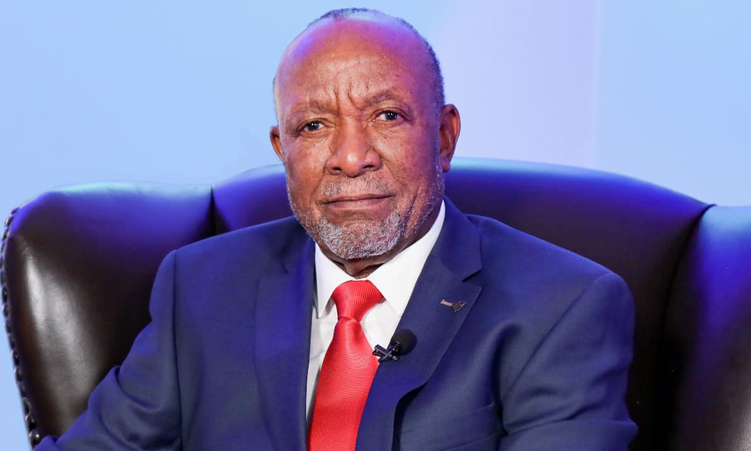MOSES MAGADZA THE United Nations Office on Drugs and Crime (UNODC) has donated medical equipment worth N$550 000 to the Namibian Correctional Service (NCS) as Namibia walks the talk on improving conditions it the country’s correctional facilities.
UNODC secured the equipment with financial assistance from the Swedish International Development Cooperation Agency (Sida). The equipment will enable the NCS to set up a clinic at the female section of the Windhoek Correctional Facility.
Signe Rotberga, the UNODC regional coordinator, handed over the equipment to the head of the NCS, commissioner general Raphael Hamunyela, last Wednesday.
Hamunyela thanked UNODC for the donation, which he said was timely. The NCS plans to open a female centre in March at the Windhoek Correctional Facility premises with a carrying capacity of 108 inmates.
The planned female centre will serve as the correctional centre for all female offenders admitted into the NCS, programmed for the education and training of female inmates.
Additionally, the female centre would have a child-friendly area for children under the ages of two to bond with their mothers. Hamunyela revealed that the NCS had eight circumstantial children – children who are in correctional facilities together with their convicted mothers across its facilities.
“The female centre will also have a health clinic to cater for the health of female inmates. Hence, the support with furniture and medical equipment to furnish the female centre’s clinic by the UNODC is indeed a befitting gesture, particularly in light of the current financial constraints,” he said.
The donated equipment includes desks, chairs, benches, couches, cabinets, refrigerators, television sets and medical equipment, including a wheelchair, trollies, thermometers, drip stands, beds, mattresses, bedside lockers, pillows, blankets, bed sheets and steps.
Hamunyela said over the years, UNODC has supported the NCS significantly.
“The support by the UNODC goes way back, and we have recorded a lot of projects since 2015, ranging from training our officers and offenders in HIV-AIDS management; fitting our two ambulances with the best equipment; spearheading the drafting of the NCS’ health policy; supplying us with doctors’ kits and equipment; funding seven NCS officers for important educational trips aimed at change management; funding the NCS to host critical meetings and training; and many other activities. The list is endless,” he said.
He acknowledged the role Ruusa Mushimba, the UNODC Namibia programme coordinator, played in facilitating the collaboration between UNODC and the NCS.
He revealed that recently, UNODC agreed to fund rehabilitation programmes in the NCS under the auspices of the Doha Declaration on Trade-Related Aspects of Intellectual Property Rights (TRIPS) Agreement and Public Health, which reaffirms flexibility in circumventing patent rights for better access to essential medicines.
“Projects which are currently at different stages of development include the creation of a soap-manufacturing project, and the refurbishment of the industrial workshop at the Windhoek Correctional Facility, a hydroponics project, and the repair of the water reservoir at the Gobabis Correctional Facility, as well as a card-making project at the Walvis Bay Correctional Facility,” the commissioner general said.
He said the donation of medical equipment would enable the Namibian Correctional Service to discharge its mandate of providing “safe, secure and humane custody of offenders to rehabilitate and reintegrate them into the community as law- abiding citizens”.
Hamunyela said the NCS’ vision was to be Africa’s leader in the provision of correctional services, adding that with all-weather friends like UNODC, it is no longer a question of if, but when, that vision would be achieved.
“We stand ready to intensify our collaboration, and be able to introduce more programmes for offenders, even after they are released.”
UNODC’s view is that ensuring that people in correctional facilities enjoy the same or even equitable access to health facilities and services as the general population was often easier said than done due to the unique challenges that people in confinement face.
The UN agency said the prevalence of diseases such as tuberculosis and HIV-AIDS is much higher in correctional facilities than in the general population. Additionally, funding for health programmes in prisons is much lower than in general society.
Yet, in spite of these challenges, UNODC said some countries like Namibia have shown remarkable leadership in reforming prison systems and in the rehabilitation of prisoners, while ensuring that communities are protected from crime.
UNODC has commended the Namibian government for its unwavering commitment to the sustainable development goals (SDGs), particularly SDG 3, which seek to improve the health and well-being of all people.
It said Namibia is taking the lead in the implementation of the programme titled ‘Supporting Minimum Standards for HIV, Health and Rights in the Prison Populations of sub-Saharan Africa’, which aims to ensure that prison populations, especially women and adolescents in prison, have access to good quality HIV-AIDS and sexual and reproductive health and rights (SRHR) services.
UNODC says the Namibian Correctional Service has set an exemplary scene for other countries to follow on issues related to incarceration and health, this at a time when each year, over 30 million men and women spend time in correctional facilities, which typically have a higher prevalence of HIV, TB, sexually transmitted infections, and hepatitis A and B.
UNODC’s view is that sexual and reproductive health is one of the fundamental human rights, and is integral to the health and well-being of every person, including those incarcerated, and that prisoners and people who use drugs (PWUD) have greater risks of HIV infection in comparison to the general population.
In some countries, prisoners and other hard-to-reach members of society who are also known as key populations are often not adequately reached with quality health services. In some instances, prisoners also frequently experience violations of their human rights.
UNODC said for Namibia to achieve the sustainable development goals (SDGs), access to quality SRHR and HIV services by everyone, including prisoners, must be prioritised.
Given that equipment is not a silver bullet, UNODC encouraged correctional services to be relentless in building the capacity of their staff to effectively support ongoing reforms of the prison sector, in line with the Nelson Mandela rules, which stipulate the minimum package of care and services that people in confinement are entitled to.
Stay informed with The Namibian – your source for credible journalism. Get in-depth reporting and opinions for
only N$85 a month. Invest in journalism, invest in democracy –
Subscribe Now!







